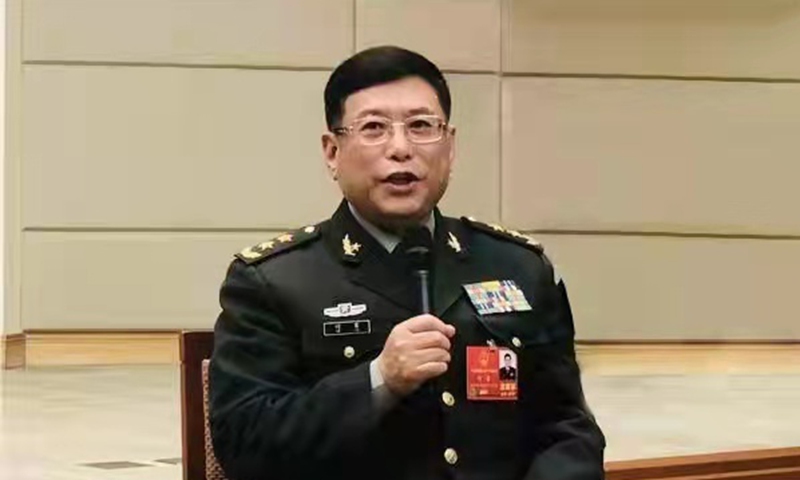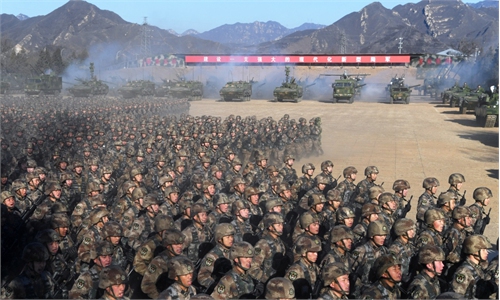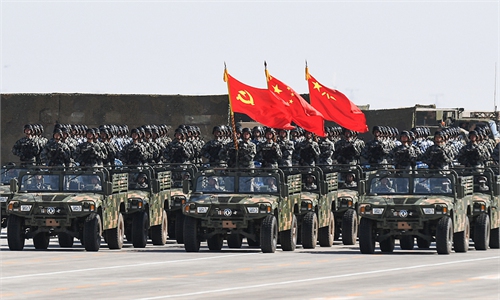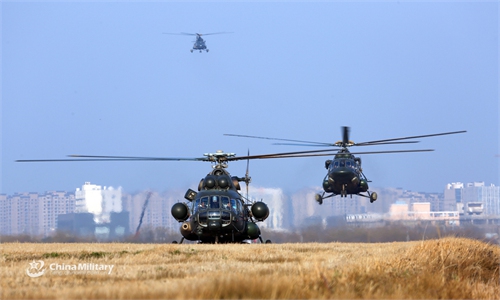
Lieutenant General He Lei Photo: Courtesy of He Lei
China's defense budget has always been a hot topic at the country's annual two sessions, drawing close attention from both at home and abroad.According to a draft budget report submitted at the opening of the annual session of the National People's Congress (NPC) on Friday, China increased its 2021 defense budget by 6.8 percent to over 1.35 trillion yuan ($209 billion). The budget increase is 0.2 percentage points higher than the figure in 2020.
Major and significant changes unseen in the past century are unfolding around the world at an accelerating pace. The COVID-19 pandemic has swept the world, resulting in a large numbers of casualties and severe economic recessions. It now poses profound impacts on the global strategic patterns and security. Peaceful development and win-win cooperation are supposed to be irresistible trends of the times. But hegemonism, power politics, protectionism, and unilateralism are on the rise at the same time.
Regional conflicts and local wars are continuing. Threats in the fields of non-traditional security, such as cybersecurity and biosecurity, are becoming increasingly prominent. Countries around the world are attaching great significance to national defense and military building, and are increasing their defense expenditures. Some countries have raised their defense spending, despite the fact their economies, badly hit by the coronavirus, are suffering from negative growth.
China's defense expenditures attend to both development and security. China is making an integrated effort to build a prosperous country and a strong military. It is striving for the coordinated development of both the national defense and the economy. Following the principle of building the armed forces through diligence and thrift, China takes into consideration the development of its economy and the demands of its national defense and decides on the appropriate scale and composition of defense expenditure.
China is an independent and sovereign country, and one of the countries with the largest number of neighbors, the longest land border, and a complex marine situation. At present, disputes over land boundaries, island territories, and delimitation of marine boundaries have not yet been resolved. With the development and progress of science and technology, space security has become a strategic guarantee for national construction and social development. Meanwhile, cyberspace has become a crucial part for national security, economic and social development. The People's Liberation Army (PLA) faces a tough task in safeguarding China's territorial sovereignty, maritime rights and interests, and interests in new major security fields.
China is the only permanent member of the UN Security Council that has not achieved complete national reunification. The estrangement between the Chinese mainland and the island of Taiwan has lasted for 70 years. Without a complete reunification, the great rejuvenation of the Chinese nation will be impossible. Since Tsai Ing-wen was reelected the island's top leader, her true nature as a secessionist has been fully exposed. The secessionist forces pursuing "Taiwan independence" have conducted various rampant activities. They have posed serious threats to the security and stability of the Taiwan Straits and undermined the peaceful reunification of the two sides. China is the largest developing country in the world. While China's interests abroad are expanding, it is also confronted with realistic threats such as international and regional turbulences, extremism and terrorism. There are strategic needs for the PLA to safeguard the security, legitimate rights and interests of Chinese citizens, organizations and institutions overseas. This mission has become increasingly prominent.
China is a responsible power in the world. With its modernization drive and growing national strength, China's international status and global influence has risen significantly. The international community now has a growing expectation for China to play a bigger role in international affairs and for the Chinese military to provide more international public security goods. To promote regional and world peace and stability, the PLA has taken the important tasks of international peacekeeping, escorting missions at distant sea waters as well as humanitarian rescue and assistance within the framework of the United Nations.
China's defense budget is carefully invested to ensure national defense security and the modernization of the armed forces. It also crucially safeguards national sovereignty, security and development interests, while maintaining regional and global peace and stability.
China's defense expenditure covers the PLA's active and reserve services as well as the militia. In recent years, China's defense expenditure has mainly been used to improve the livelihood of officers and soldiers, increase investment in weapons and equipment development and promote their modernization. They have also catered to the needs of military training and carrying out diversified military tasks.
China is a law-based country: China is governed by the rule of law and its military is run in accordance with the law. The Chinese government is a people's government of integrity and trustworthiness. The investment, use and management of China's national defense expenditures are strictly in compliance with the law. They are also objective, authentic, open and transparent to the Chinese public as well as the international community. There is no such thing as the so-called invisible military expenditures, nor does China need them.
Since 1998, the Chinese government has published several white papers on national defense to publicly introduce to domestic and international audiences information about China's defense spending, including its scope, main uses, and proportion of financial expenditures. Since 2007, China has participated in the UN system for the standardized reporting of military expenditures, and has annually submitted to the UN basic data on defense spending for the previous fiscal year.
Since 2009, China's total defense spending has ranked No.2 in the world. Even as this is the case, China's total defense spending is about only a fourth of the US', which ranks first in the world. Meanwhile, China's relative amount remains pretty low compared to other major military powers in the world, including the US. For example, in fiscal year 2021, the US will spend $740.5 billion on defense, accounting for nearly 40 percent of the world's total defense spending. That is much higher than the combined total of the other nine countries in the world's top 10. China's defense budget of 1.35 trillion yuan ($209 billion) is just 28.2 percent of US defense spending.
By strengthening its national defense power, China increases its ability to defend national interests and maintain world peace.
China is a socialist country that loves and maintains peace. The country has always firmly adhered to the pursuit of peaceful development and followed an independent foreign policy. This is the basic spirit which has been written into the Chinese Constitution. China's pursuit of a defensive national defense policy and its adoption of the strategic guideline of active defense have been explicitly written into the National Defense Law and has become a basic policy that the country consistently and permanently adheres to.
China does not follow the old paths of some Western countries by pursuing hegemony when the country becomes strong. Nor does it follow the evil path of an arms race and militarism. Regardless of how much China invests in national defense and how advanced the country's national defense and military modernization will become, China will never claim hegemony. China will never expand, never seek to establish its own spheres of influence, never engage in an arms race, and never ever threaten other countries.
Over the seven decades since the founding of the People's Republic of China in 1949, the country has witnessed vigorous economic development, steady national defense and increasingly powerful armed forces. However, China has never invaded nor occupied an inch of land of any country.
China has been proactively bolstering UN peacekeeping operations. China is the second-largest contributor to the UN's peacekeeping budget, and the largest contributor of peacekeepers among the five permanent members of the UN Security Council. Since the novel coronavirus outbreak, when Chinese military were fully devoted to fighting the epidemic at home, it had proactively collaborated with defense departments and militaries of many countries and had provided assistance in multiple domains. As of February 2021, the Chinese military had offered epidemic prevention supplies, technologies or experts for assistance to militaries of over 50 countries, such as Mozambique, Serbia, Cuba and Laos. It also had held visual meetings with 18 countries including Russia and international organizations to exchange their experience in preventing and controlling the deadly disease.
China has provided vaccine assistance to the militaries of Pakistan, Cambodia, Inner Mongolia and, the Philippines, just name a few. China has received extensive compliments from these countries as well as the international community, making fresh rounds of contributions to building a community of mankind in the domain of health and safeguarding global peace and stability.
The author is a deputy to the 13th NPC, PLA lieutenant general and former vice president of the PLA Academy of Military Sciences. opinion@globaltimes.com.cn



